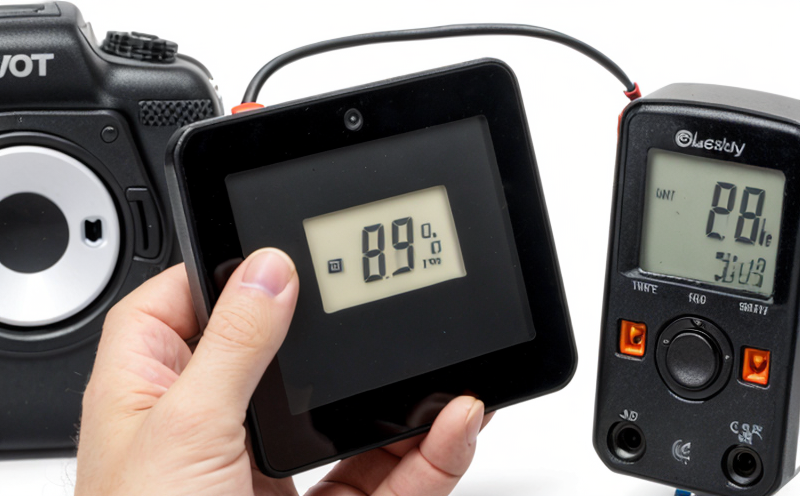Insulation Resistance Testing in Electronics
In consumer products and product safety testing, particularly within the realm of electronics and small devices, insulation resistance (IR) is a critical parameter that ensures safe operation. This test measures the electrical resistance of an insulating material to prevent current flow through unintended paths. Proper IR testing is essential for identifying potential hazards such as short circuits or exposed conductors in electronic products.
Electrical safety regulations, including standards like IEC 60950-1 and UL 60950-1, require the use of insulation resistance tests to ensure that the insulation materials used meet strict electrical safety requirements. The primary purpose is to prevent shocks or fires caused by faulty insulating materials in appliances or devices.
The test involves applying a specific voltage across the component under test and measuring the resulting current flow. The ratio of this applied voltage to the measured current provides the IR value, expressed in megohms (MΩ). The higher the IR value, the better the insulation performance. For example, household appliances often require an IR rating of at least 2 MΩ.
For R&D engineers and quality managers, understanding how to interpret these results is crucial for ensuring product compliance with relevant international standards. This test helps in identifying potential weaknesses or defects early in the development process, thereby reducing costs associated with recalls or safety issues post-launch.
The correct method of specimen preparation plays a vital role in obtaining accurate IR readings. Specimens should be cleaned thoroughly before testing to remove any dirt or contaminants that could affect measurement accuracy. Additionally, ensuring proper grounding and shielding helps minimize external electrical interference during the test.
- Applying appropriate voltage levels based on the specific application
- Ensuring adequate cooling time between tests for accurate readings
- Using suitable measuring instruments with high precision
- Following strict environmental conditions during testing to avoid variations
The choice of test voltage is critical, typically ranging from 50V up to 1000V DC depending on the expected working voltage of the product. Higher voltages are used for more robust products like power tools or industrial machinery.
Understanding the significance of IR testing not only aids in compliance but also enhances overall product reliability and safety. By adhering to industry best practices, manufacturers can ensure their electronic devices meet stringent quality standards, thereby protecting end-users from electrical hazards.
Benefits
The benefits of insulation resistance testing in electronics are multifaceted and extend beyond mere compliance with regulations. This testing process enhances product safety by identifying defects early in the manufacturing cycle, which can significantly reduce post-market failures leading to recalls or customer dissatisfaction.
By conducting thorough IR tests during R&D phases, manufacturers can optimize design iterations while ensuring that all components meet specified electrical resistance thresholds. Early detection of issues allows for cost-effective corrections rather than addressing more significant problems later in production.
In terms of compliance, adhering to standards like IEC 60950-1 ensures that products are not only safe but also marketable internationally. Many countries require specific IR ratings on labels or documentation accompanying certain electronic goods. Meeting these requirements helps streamline export processes and avoid costly delays.
Quality assurance through rigorous IR testing contributes to long-term brand reputation by demonstrating a commitment to delivering reliable, safe products consistently. Consumers trust brands that prioritize safety above all else, leading to increased customer loyalty and repeat purchases.
Eurolab Advantages
At Eurolab, we pride ourselves on offering comprehensive testing solutions tailored specifically for consumer products and electronics. Our state-of-the-art facilities equipped with advanced instruments ensure precise and reliable results every time.
- ISO/IEC 17025 accreditation ensures compliance with international standards
- A dedicated team of experts providing personalized service and support
- Access to cutting-edge technology for accurate measurements
- Comprehensive reporting services offering detailed insights into test outcomes
We understand the importance of timely delivery, which is why we maintain strict deadlines without compromising on quality. Our commitment to excellence has earned us a reputation among leading companies worldwide as their trusted partner in ensuring product safety and compliance.
Quality and Reliability Assurance
- Consistency: Ensuring consistent results across multiple tests through standardized procedures.
- Accuracy: Using precise instruments to measure IR values accurately, minimizing errors due to environmental factors.
- Traceability: Maintaining a chain of custody for specimens throughout the testing process to ensure accurate reporting.
- Data Integrity: Safeguarding all data collected during tests against unauthorized access or corruption.
To further enhance reliability, we employ statistical methods such as control charts and process capability studies. These tools help us monitor trends over time and identify any deviations promptly so corrective actions can be taken immediately.





